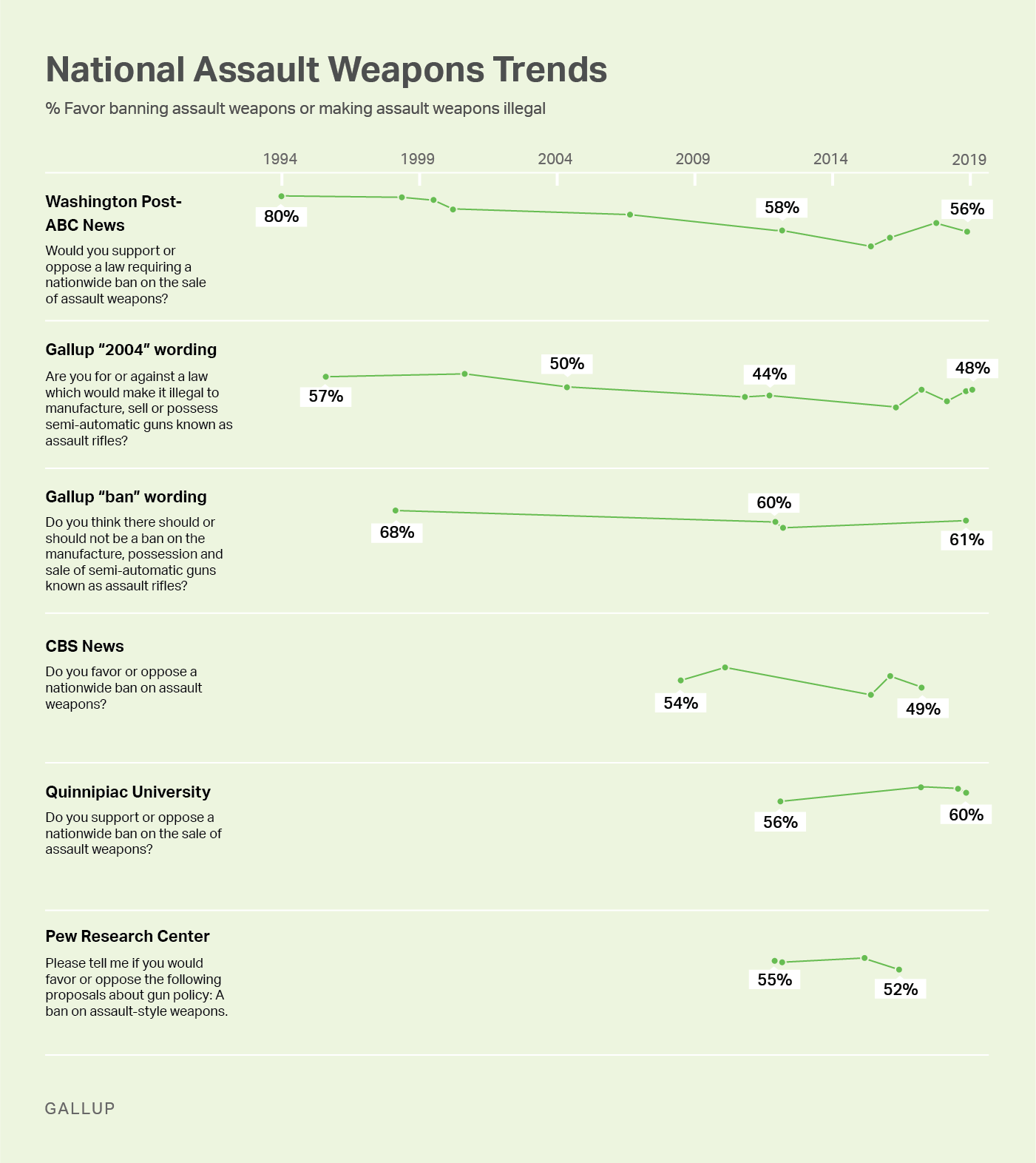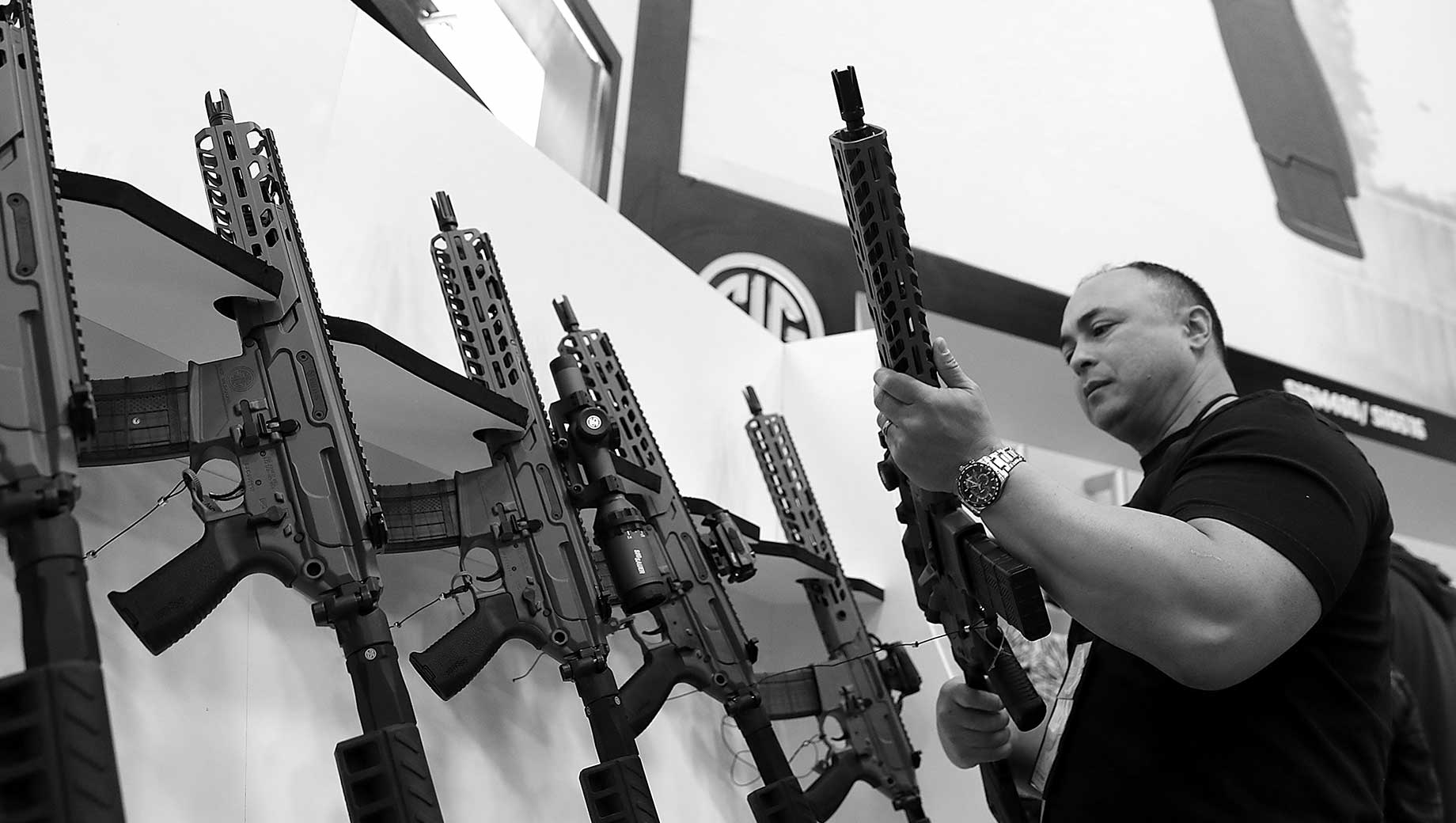Where does the American public stand on the issue of banning assault weapons? Based on new research conducted over the past several months, and on a review of other recently published results, our summary conclusion is that a clear majority of about six in 10 Americans currently support such a ban.
A bit of history is in order. ���۴�ýfirst asked about assault weapons in 1989 using this question wording: "Would you favor or oppose federal legislation banning the manufacture, sale and possession of semi-automatic assault guns, such as the AK-47?" The results showed 72% of Americans in favor. ���۴�ýasked a similar question about a "ban on assault weapons" on an intermittent basis in the years thereafter, always finding a majority in favor, albeit with different levels of support.
In 1996, ���۴�ýused different wording to ask about assault weapons, structuring the question to fit into a referendum format measuring support for a list of different proposals: "Now, I am going to read several propositions that would prohibit and make illegal certain activities. Would you vote for or against a law which would make it illegal to manufacture, sell or possess semi-automatic guns known as assault rifles?" The results showed 57% in favor. ���۴�ýagain used that wording in 2000, showing a similar percentage (59%) in favor.
In 2004, ���۴�ýasked about assault weapons around the time a ban on those types of guns -- included as part of the Violent Crime Control and Law Enforcement Act of 1994 -- expired. ���۴�ýtook the wording of the assault weapons question that had been used in the referendum list and set it up as a standalone question, as follows: "Are you for or against a law which would make it illegal to manufacture, sell or possess semi-automatic guns known as assault rifles?" In so doing, ���۴�ýdropped the introductory clause ("Now, I am going to read several propositions that would prohibit and make illegal certain activities …") from the question.
In that 2004 survey, conducted a few weeks after the assault weapons ban expired (with little push for preserving it in Congress), 50% of Americans said they were in favor of a law that would make it illegal to manufacture, sell or possess semi-automatic guns. In subsequent surveys using the same wording in 2011, 2012, 2016, 2017 and 2018, the percentage in favor ranged from 36% to 48%. (I'll call this the "2004" wording since that was the first year it was used).
���۴�ýlast published the results of a survey using this "2004" wording in October 2018, with the headline "Majority in U.S. Now Oppose Ban on Assault Rifles."
���۴�ýalso used variations of a question asking about a "ban" in other surveys in the 1990s and twice in 2013. (The 2013 wording, included in a list testing several policy proposals, was as follows: "Would you vote for or against a law that would ... reinstate and strengthen the ban on assault weapons that was in place from 1994 to 2004?") We don't have a direct comparison of the results of the two wordings (the "ban" wording and the "2004" wording) since we didn't ask both questions in the same survey. But we do know that while the "2004" wording in 2012 and 2016 showed well less than a majority supporting making assault weapons illegal, both of the times we asked about a "ban" in 2013 showed a clear majority (of 56% and 60%) in favor.
Additional Research This Year
���۴�ýis not alone in asking Americans about their views on assault weapons, of course. A number of research firms have included the issue in surveys over the past 25 years.
The accompanying graph displays Gallup's results along with those collected by Quinnipiac University, Washington Post-ABC News, Pew Research Center and CBS News. The data show considerable variation -- and at times, particularly in 2017, the results using Gallup's "2004" wording are roughly similar to those shown by at least one other survey.

But, more recently, polls conducted by all four non-���۴�ýorganizations in 2018 showed significantly higher support for banning assault weapons than Gallup's 2018 results. All four of these other organizations used a variation of the "ban" wording, while Gallup's 2018 question, as I noted previously, used the "2004" wording. Our recognition of these differences and a review of our history of asking about assault weapons led us to conduct two split-sample experiments on the topic, in August and September of this year.
First Experiment: August 2019
The first experiment, included in Gallup's Aug. 15-30 national poll, was a straight head-to-head comparison of the "2004" wording and Gallup's "ban" wording, with half of respondents randomly assigned to each.
The results:
| For law / Should | Against law / Should not | ||||||||||||||||||||||||||||||||||||||||||||||||||||||||||||||||||||||||||||||||||||||||||||||||||
|---|---|---|---|---|---|---|---|---|---|---|---|---|---|---|---|---|---|---|---|---|---|---|---|---|---|---|---|---|---|---|---|---|---|---|---|---|---|---|---|---|---|---|---|---|---|---|---|---|---|---|---|---|---|---|---|---|---|---|---|---|---|---|---|---|---|---|---|---|---|---|---|---|---|---|---|---|---|---|---|---|---|---|---|---|---|---|---|---|---|---|---|---|---|---|---|---|---|---|---|
| % | % | ||||||||||||||||||||||||||||||||||||||||||||||||||||||||||||||||||||||||||||||||||||||||||||||||||
| Are you for or against a law which would make it illegal to manufacture, sell or possess semi-automatic guns known as assault rifles? (N=1,099) | 47 | 51 | |||||||||||||||||||||||||||||||||||||||||||||||||||||||||||||||||||||||||||||||||||||||||||||||||
| Do you think there should or should not be a ban on the manufacture, possession and sale of semi-automatic guns known as assault rifles? (N=1,192) | 61 | 38 | |||||||||||||||||||||||||||||||||||||||||||||||||||||||||||||||||||||||||||||||||||||||||||||||||
| Gallup, Aug. 15-30, 2019 | |||||||||||||||||||||||||||||||||||||||||||||||||||||||||||||||||||||||||||||||||||||||||||||||||||
The "ban" wording shows 61% favoring a ban on assault rifles, similar to the average of what other surveys have found over the past two years. The "2004" wording shows a slight majority opposed to a law that would make assault rifles illegal, similar to what ���۴�ýfound and reported in 2018.
Why the differences? One possibility could be that the "2004" wording is confusing to respondents. The "2004" ���۴�ýwording asks respondents whether they are "for or against a law which would make it illegal" without the introductory phrase initially used in 1996 and in 2000. It's possible that this wording has elements of a double negative, leaving some respondents unclear whether the "for" or "against" position represents a pro-gun or pro-ban stance.
To gain further insight into this hypothesis, we analyzed responses to various gun control questions (asked in our August 2019 survey) based on the education level of the respondent. There is little difference by education level in response to a classic ���۴�ýquestion asking about stricter gun control laws, and there is little difference by education in the "ban" assault weapons question. But there is significant difference related to education level in response to the "2004" question, with college-educated adults much more likely than those with no college education to say they are for a law making assault rifles illegal. This suggests there may well be a degree of difficulty in understanding the question among those with lower levels of education.
| No college | Some college | ||||||||||||||||||||||||||||||||||||||||||||||||||||||||||||||||||||||||||||||||||||||||||||||||||
|---|---|---|---|---|---|---|---|---|---|---|---|---|---|---|---|---|---|---|---|---|---|---|---|---|---|---|---|---|---|---|---|---|---|---|---|---|---|---|---|---|---|---|---|---|---|---|---|---|---|---|---|---|---|---|---|---|---|---|---|---|---|---|---|---|---|---|---|---|---|---|---|---|---|---|---|---|---|---|---|---|---|---|---|---|---|---|---|---|---|---|---|---|---|---|---|---|---|---|---|
| % | % | ||||||||||||||||||||||||||||||||||||||||||||||||||||||||||||||||||||||||||||||||||||||||||||||||||
| In general, do you feel that the laws covering the sale of firearms should be made more strict, less strict or kept as they are now? (N=2,291) (% More strict) | 60 | 65 | |||||||||||||||||||||||||||||||||||||||||||||||||||||||||||||||||||||||||||||||||||||||||||||||||
| Are you for or against a law which would make it illegal to manufacture, sell or possess semi-automatic guns known as assault rifles? (N=1,099) (% For law) | 36 | 55 | |||||||||||||||||||||||||||||||||||||||||||||||||||||||||||||||||||||||||||||||||||||||||||||||||
| Do you think there should or should not be a ban on the manufacture, possession and sale of semi-automatic guns known as assault rifles? (N=1,192) (% Should) | 61 | 61 | |||||||||||||||||||||||||||||||||||||||||||||||||||||||||||||||||||||||||||||||||||||||||||||||||
| Gallup, Aug. 15-30, 2019 | |||||||||||||||||||||||||||||||||||||||||||||||||||||||||||||||||||||||||||||||||||||||||||||||||||
Second Experiment: September 2019
In a Sept. 16-30 poll, ���۴�ýsplit a large sample of over 2,400 respondents into three random samples of approximately 800 respondents each, assigning each sample a different version of the assault weapons question. Group 1 received the "2004" wording, as a reference point; Group 2 was asked a version of the "2004" wording that removed a possible double negative, simplifying the "2004" question and asking directly about making the sale or possession of assault rifles "legal" or "illegal." And, focusing on the possibility that the way in which assault weapons are described to respondents could make a difference, Group 3 was asked a question similar to that asked of Group 2, but with a more explicit description of the weapons involved.
The results:
| For law / Should be illegal | Against law / Should be legal | ||||||||||||||||||||||||||||||||||||||||||||||||||||||||||||||||||||||||||||||||||||||||||||||||||
|---|---|---|---|---|---|---|---|---|---|---|---|---|---|---|---|---|---|---|---|---|---|---|---|---|---|---|---|---|---|---|---|---|---|---|---|---|---|---|---|---|---|---|---|---|---|---|---|---|---|---|---|---|---|---|---|---|---|---|---|---|---|---|---|---|---|---|---|---|---|---|---|---|---|---|---|---|---|---|---|---|---|---|---|---|---|---|---|---|---|---|---|---|---|---|---|---|---|---|---|
| % | % | ||||||||||||||||||||||||||||||||||||||||||||||||||||||||||||||||||||||||||||||||||||||||||||||||||
| "2004" wording: Are you for or against a law which would make it illegal to manufacture, sell or possess semi-automatic guns known as assault rifles? (N=830) | 48 | 49 | |||||||||||||||||||||||||||||||||||||||||||||||||||||||||||||||||||||||||||||||||||||||||||||||||
| Modification 1: Do you think it should be legal or illegal to manufacture, sell or possess semi-automatic guns known as assault rifles? (N=825) | 57 | 41 | |||||||||||||||||||||||||||||||||||||||||||||||||||||||||||||||||||||||||||||||||||||||||||||||||
| Modification 2: Do you think it should be legal or illegal to manufacture, sell or possess high-capacity semi-automatic rifles such as the AR-15, AK-47 or M16? (N=776) | 62 | 36 | |||||||||||||||||||||||||||||||||||||||||||||||||||||||||||||||||||||||||||||||||||||||||||||||||
| Gallup, Sept. 16-30, 2019 | |||||||||||||||||||||||||||||||||||||||||||||||||||||||||||||||||||||||||||||||||||||||||||||||||||
Group 1's baseline "2004" wording, as we would expect, produced results similar to the other times this question wording has been used recently.
The results for Group 2 showed 57% of respondents saying such sale or possession should be illegal, similar to the "ban" wording in the August experiment and similar to what other recent non-���۴�ýsurveys have found. In short, removing the phrase "for or against a law which would make it illegal" and replacing it with more direct wording makes a difference. This further supports the idea that the responses obtained using the "2004" wording may have reflected, in part, respondent difficulty in understanding the question.
Notably, as was the case for the August experiment, there were significant differences in responses to the baseline "2004" question by education level, but almost no differences by education in responses to the more direct wording in Group 2.
As noted, the Group 3 wording was structurally the same as the Group 2 wording but used more specific language to refer to assault rifles, calling them "high-capacity semi-automatic rifles such as the AR-15, AK-47 or M16." This was designed to address concerns raised by some observers about the technical accuracy of the term "assault rifle" and to address possible respondent uncertainty about the types of weapons to which the term "assault rifles" refers.
There were only minor differences in responses to the descriptions of assault weapons used in the Group 3 question compared with the description in the Group 2 question. Both wordings produced clear majority support for making the sale or possession of such guns illegal, compared with the divided results using the "2004" wording (Group 1).
Conclusion
The overall results of these experiments confirm that asking Americans if they are "for or against a law which would make it illegal to sell or possess assault rifles" produces a lower level of support than asking them about such actions using a specific reference to a "ban" or by simplifying wording to ask directly about making ownership or manufacture of assault weapons illegal. It may be that the first wording is confusing to some respondents, particularly for those with less formal education. The use of more direct wording points to the conclusion evident from the preponderance of other research conducted in 2018 and 2019 -- that a majority of Americans support a ban on assault weapons at this time.




